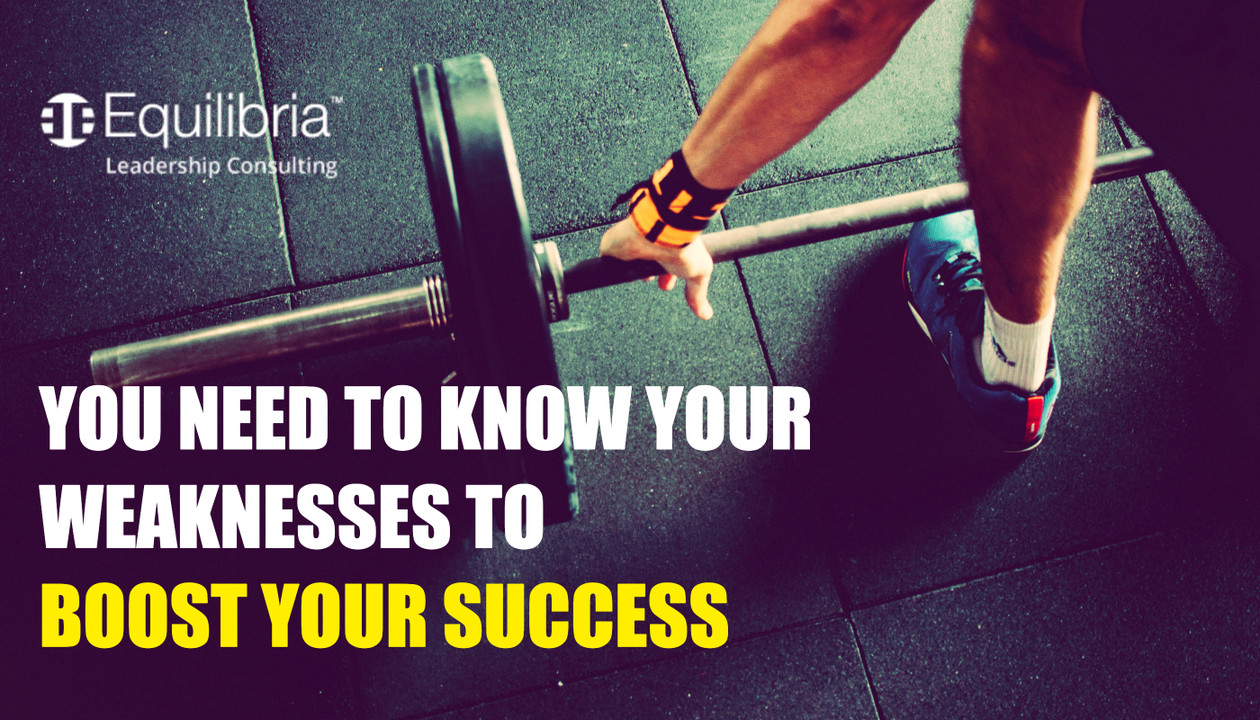What I fear has been lost with the focus on positive psychology and the strengths-based leadership movement is that if you neglect your weaknesses, they’ll eventually overshadow your strengths.
Your weakness may become your Achilles heel.
If you have a strong right arm and a very weak left arm you will always favor your strong arm to carry something heavy.
Over time, you risk tweaking your back because you’ve been putting so much weight on one side of your body.
The same logic applies to our personalities when it comes to strengths and weaknesses.
You might be the world’s best cheerleader but that might ultimately hurt you as you build your executive presence.
Let’s say your strength is collaboration but your weakness is advocating for yourself. While you focus on being an integral member of a work team, you might get passed up for promotion because you haven’t boosted your self-promotion skills.
When it comes to myself, I think I’m a compassionate, empathetic person but I also have a tendency to be very impatient.
Being empathetic and compassionate gets me in the door; they are my strengths. But being impatient is what people remember and could potentially kick me out of the door.
WHAT TO DO ABOUT IT
The good news: science has taught us we are constantly building neural connections. We have the ability to grow and evolve. We have the ability to develop our weaknesses.
First, however, you have to know what your weaknesses are. The best resource to discover where you need improvement is people who know you well.
- Do a mini 360: Ask people who know you, personally and professionally: What are three things you see as my strengths and three as my weaknesses? Knowing how you come off to others might shock you (it also might not) but you want to have that knowledge under your belt. You may think you are the best communicator in the world but if everyone around you sees you as a poor communicator, you are a poor communicator and need to work on it. Be open to the fact that you’re not perfect.
- Practice the skill. Just like you unintentionally practice your strengths (e.g. favoring your strong arm) you need to start building your weaker muscles. True practice goes hand in hand with real time feedback so be honest with people around you (professionally and personally) about what you are working on and get real time feedback.
- Hire a coach. If your company is willing, perhaps they will pay for it. If not, invest in yourself. A good coach will keep you on track, provide feedback and objectivity with regard to how you are progressing. It’s great to have someone in your corner who simultaneously supports you and doesn’t let you off the hook.
- Look to someone whose strength is your weakness. Model their behavior. Ask for advice/coaching, etc. Maybe it was once a weakness for them and they found a loophole into how to make it a strength. Maybe one of your strengths is their weakness and you can mutually benefit from one another.
- Go to a training workshop specific to the weakness you want to work on. You might walk away with tools you can use and accountability partners. Plus, it might reassure you to meet others who are in the same boat as you.
FOCUSING ON YOUR WEAKNESSES IS A STRENGTH IN DISGUISE
The willingness to accept your weaknesses in the interest of self-improvement is actually a vital strength. It will play a central role in your personal and professional success.
Even if you don’t agree with the feedback you receive, the ability to simply consider them, to openly receive the feedback, to mull it around in your head as a possibility, shows great strength and humility.
When someone cannot tolerate any criticism or accept that he/she might be weak in some area, that creates a roadblock for themselves and those with whom they interact, both personally and professionally.
Keep an open mind and play the part of curious observer as you learn about yourself.
It can be embarrassing to admit to yourself that you fall short in some area. Negative emotions might creep up. Allow them to. Don’t attach yourself to them.
Negative emotions come and go, but they stay when they are given attention. If you hear something you don’t like, just listen and ponder it if you don’t agree wholeheartedly at first.
COMMIT TO YOURSELF
In 2019, commit to yourself: not only will you continue to build up your strengths but you’ll adopt a growth mindset to work on your weaknesses.
I’m not suggesting ignoring your strengths. It’s important to know what your strengths are so you can excel in life. Your strengths will most likely get you hired and promoted; if you are an entrepreneur, they will be the foundational skills for building your business.
But it’s also crucial to know what your weaknesses are. If you only focus on your strengths, then only your strengths will improve, while your weaknesses atrophy.
This isn’t about beating yourself up and/or feeling less than. This is about development. This is about acceptance over denial. This is about fulfilling your creative, human potential.


